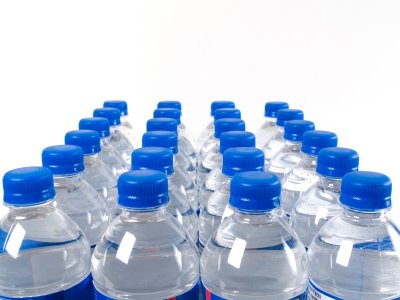It is common to see people greatly misuse plastic water bottles considering it free, taking a bottle, sipping it half and throwing it away. These used and partially consumed water bottles are then collected and thrown away in municipal garbage bins from where it is collected and transported to landfills and waste dumps. These water bottles thus have a high carbon footprint and represent enormous wastage of precious water source and misuse of our other fragile resources. In many cases, these water bottles are being littered around the commercial and religious places.
Plastic water bottles are a common feature in our urban daily life. Bottled water is widely used by people from all walks of life and is considered to be convenient and safer than tap water. A person on an average drinks around 2.0 liters of water a day and may consume 4-6 plastic bottles per day. UAE is considered as the highest per capita consumer of bottled water worlwide.
We need to understand that plastic is made from petroleum. 24 million gallons of oil is needed to produce a billion plastic bottles. Plastic takes around 700 years to be degraded. 90% of the cost of bottled water is due to the bottle itself. 80% of plastic bottles produced are not recycled.
Globally, plastic recycling rate is very low and major quantities of plastics are being disposed in the landfills, where they stay for hundreds of years not being naturally degraded. Recycling one ton of plastic saves 5.74 cubic meters of landfill space and save cost of collection and transportation.
Water bottles manufacturing, transportation, distribution and again collection and disposal after its use create enormous pollution in terms of trash generation, global warming and air pollution. The transportation of bottled water from its source to stores alone releases thousands of tons of carbon dioxide. In addition to the millions of gallons of water used in the plastic-making process, two gallons of water are wasted in the water purification process for every gallon that goes into the plastic bottles. Purified water from under sink reverse osmosis system is the best alternative of plastic bottled water.
The first step is that once you open a water bottle, you need to complete consume it to fully utilize the resource. Do not throw the plastic bottles as litter. The solution to the plastic bottles usage lies in its minimum use and safe disposal. Alternatively, a flask, thermos or reusable water bottle can be used which can be refilled as required. It is suggested that religious places, hotels and malls should have efficient water treatment plants to reduce the use of plastic water bottles.






Pingback: How to Make an Environmentally-Conscious Person | EcoMENA
Pingback: Reducing Carbon Footprint In Your Home | Cleantech Solutions
Pingback: Eco-building a Plastic Bottle Village From Rubbish Removal | EcoMENA
Pingback: A Message on Earth Day | EcoMENA
Pingback: Business Waste Management - What Your Business Can Do Better | EcoMENA
Pingback: Why You Need an Eco-Friendly Water Filter at Home | EcoMENA
Pingback: Water is Life, Plastic is Not | Branding Blog | The Bullet
Pingback: Eco-friendly Ways of Traveling | EcoMENA
nice article! it turns out that used plastic bottles can be used as useful tools rather than being thrown away in vain and making the environment dirty. this is a simple action to protect our earth
and used plastic bottles can also be used as plant pots!
thanks for sharing!